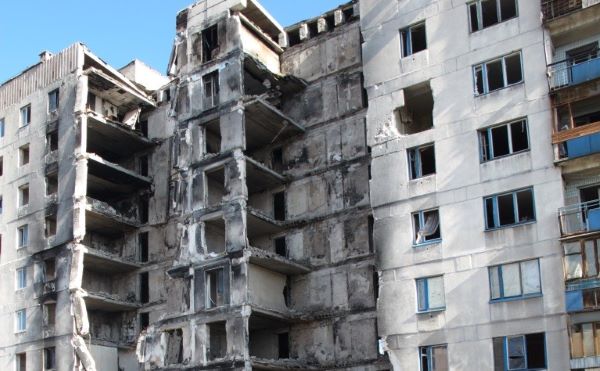5 February 2023 ~
It is never wrong to do the right thing, but it often takes courage and integrity and may require a sacrifice. A topic that has become something of a theme for me, is how far will we go to ensure that International Humanitarian Law is respected and upheld and that civilians are protected during a conflict. How many atrocities does it take before human suffering means more, than stepping on the toes of the country inflicting anguish on its people, or offending the allies of the country committing the violations?
My birthday is 27 January – it is also International Holocaust Remembrance Day. Every year, in addition to celebrating my birth, I am also reminded of the millions of lives that ended during the Holocaust. The day of commemoration recognizes the liberation of the Auschwitz-Birkenau concentration camp on 27 January 1945.
Holocaust remembrance is intended to give society reason to pause and consider how attitudes of hate and discrimination can lead to mass murder. It is intended to teach society to be tolerant, to coexist, and to be compassionate toward each other. It is meant to remind us of what happens when we “other” each other and allow a few to systematically destroy a group of people for no other reason than they simply do not like them. How far will we go to keep the promise of ‘Never Again’? The day of remembrance offers reflection, atonement, and healing, but it also serves as a warning to the rest of the world that it has a responsibility to protect, act, and prevent such atrocities from happening again.
Why? We Never Learn
Since the liberation of Auschwitz-Birkenau, the world has witnessed the mass destruction of populations around the world; and at the end of each, a vow of ‘Never Again’, to prevent something similar in the future. Cambodia under the Khmer Rouge saw the destruction of nearly three million people. The Darfur genocide, still ongoing since 2003, has counted more than a half-million people killed. Nearly 100,000 people were killed in the Bosnian War, and as many as 8,000 men and boys were killed in Srebrenica. Some 800,000 Tutsi, Twa, and moderate Hutu were massacred in Rwanda in 100 days in 1994, of which former President Bill Clinton counted US inaction as a “lifetime regret.” Today, hate and discrimination against the Rohingya of Myanmar continue as millions have fled the country, trying to find peace and security.
Ongoing conflicts and crises in Syria, Yemen, Iraq, and Afghanistan have witnessed hundreds of thousands of lives lost, and displacements that have surpassed historic records. In 2022, the number of displaced persons, as a result of conflict and persecution exceeded 100,000,000 people.
Unprovoked Invasion
It is impossible to ignore the brutality of Russia’s unprovoked invasion of Ukraine. Every day, the world is met with photos, videos, and stories – each one another piece of evidence of Russia’s cruel attacks and senseless destruction of human life. On the afternoon of 14 January, a nine-story apartment building in Dnipro suffered an airstrike by Russian forces. Forty-five people were killed, eighty people were seriously injured, and eleven are still unaccounted for. As first responders and emergency personnel worked to save as many people as possible, they found the bodies of a pregnant woman and her husband in one of the apartments. His arms were wrapped around his wife, protecting her and their unborn child.
How far will we go to protect humanity from bad actors… even when those bad actors are the leaders of other countries and are committing crimes with impunity?
Shaking Hands With Hatred
In 2012, former President Barack Obama drew the “red line in the sand” regarding Syria and Bashar Al Assad’s use of chemical weapons against his own people. Eleven years later, the conflict in Syria endures, and the use of chlorine barrel bombs and sarin gas against the civilian population, continues. The use of chemical weapons is a war crime… using them on civilian populations, is doubly so. There was a missed opportunity to help the people of Syria and hold Al Assad accountable in 2012.
In 2019, the US Congress unanimously passed a bill to block arms sales to Saudi Arabia as a result of its habitual targeting of civilian populations in Yemen. The outrage stemmed from an attack on a school bus filled with Yemeni children. Then President, Donald Trump vetoed the bill. Three years later, under the Biden administration, a bipartisan group of lawmakers attempted to prevent the US from selling a multibillion-dollar weapons deal to the Gulf nation, and again it was defeated. The US has been the biggest provider of arms to Saudi Arabia for decades despite the Kingdom’s atrocious human rights record. All of these were missed opportunities to help the people of Yemen.
Courage, Integrity, and Sacrifice
In 2022, after Russia’s invasion of Ukraine, the Ukrainian President Volodymyr Zelensky repeatedly requested military assistance including arms. Even as grandmothers were storing Molotov cocktails in their storage sheds and vowing to fight against the invaders, outside governments were slow to give assistance. As millions of women and children fled the country to safety, leaving their husbands, sons, brothers, and fathers to fight, the aid needed for Ukraine to defend itself from Russia’s advances was slow to arrive. The reason… outside countries were concerned that any help they extended to Ukraine might be perceived as a threat by Russia and would escalate the conflict into a world war. It is as if Russia is holding the rest of the world hostage, so it can claim Ukraine.
As EU countries and other UN member states began sending weapons and non-lethal aid to Ukraine, Putin has tried to legitimize his invasion agenda by comparing it to defending itself in WWII against Nazi Germany, but he is the one invading Ukraine – without cause. And while countries discussed weapon deliveries, Russia used its weapons to attack civilian communities, such as a maternity hospital and an apartment building on 14 January.
Russia is one of five permanent members of the UN Security Council. One. That does not give the country, or its leaders blanket immunity from being held accountable for violating International Humanitarian Law. How far will we go, to hold leaders accountable, especially UN Member States and Security Council Members?
Channel for Recourse
Every single one of these cases, and many more not discussed here, are violations of International Humanitarian Law (IHL). IHL protects persons who are not directly or actively participating in conflict and violence – namely civilians – and it enforces limits on the means and methods of warfare, for humanitarian purposes… and these are not negotiable.
Domestic courts play an important role in the enforcement of IHL and in limiting impunity. States are under obligation to investigate and prosecute alleged IHL offenders. International Humanitarian Law violations can also be investigated and prosecuted by various international criminal tribunals and the International Criminal Court (ICC) in the Hague. There are means for holding accountable the countries and persons that violate IHL… the question is how far will we go to ensure that it happens? We can do better.
With gratitude… Lara
Photo Credit: “Ukraine: IDPs daily struggle in Eastern Ukraine by EU Civil Protection and Humanitarian Aid is licensed under CC ND 2.0.
#thinkingoutloud #howfarwillwego #IHL #HolocaustRemembrance #genocide #atrocities #humanrights #Ukraine #Syria #warcrimes


#howfarwillwego to protect #humanity from bad actors… even when those bad actors are the leaders of other countries and are committing crimes with #impunity? We are not going far enough. More can and should be done to settle disputes, hold the perpetrators accountable, and bring justice to the victims. And it should not be something anyone should have to think about.
#howfarwillwego… the truth is that no country or leader goes far enough to do the right thing. Too many of them could change the dynamic of what is happening in #ukraine #syria #yemen and a dozen other situations in an instant… but they will not do what is necessary because they want to hold onto power and do not want to offend the other side. Human lives are not as valuable as resources. And that is the voice of boots on the ground experience not rhetoric.
#IHL protects persons who are not directly or actively participating in #conflict and violence – namely #civilians – and it enforces limits on the means and methods of warfare, for #humanitarian purposes… and these are not negotiable! Well done Lara Kajs!
Thanks Michael D! I appreciate the support. The fact is the “world court” created the power to hold accountable those countries and leaders who violate IHL. They can use the International Court of Justice and the International Criminal Court, and of course, the UN Security Council can use sanctions. So why don’t they? And THAT is what gets to the heart of the matter.
How Far Will We Go to hold accountable leaders and countries who deliberately disregard #IHL and commit #WarCrimes for their own personal gain? #howfarwillwego to turn and look the other way from the #humansuffering as a result of those acts?
#howfarwillwego is the latest #thinkingoutloud piece by Lara Kajs the leader of The Genocide Report. “How Far Will We Go” brings awareness the responsibility of countries and leaders to go the distance to protect civilians in conflict.
Thanks Alex… the support is much appreciated!